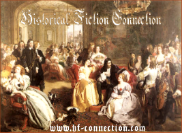
Historical Fiction Virtual Book Tours is celebrating the new release by Sandra Byrd To Die For and I was honored to have the author supply a guest post on a secret world at Hampton Court Palace.
Henry VIII had a famously acquisitive nature – and it wasn't limited to women. The man also had a passion for real estate. As king, he inherited many castles and palaces owned by the crown, but throughout his reign he added others by purchase, trade or payment of debt; through reclamation to the crown due to attainder; "recovering" property through the dissolution of assets formerly owned by the Roman Catholic church; and by "gift." A primary advisor in the early years of Henry's sovereignty was Cardinal Thomas Wolsey, a man with tastes as extravagant as the King's and who also had the means to indulge them. When the King saw Hampton Court Palace, Cardinal Wolsey’s sumptuous, Thames-side property, he envied him of it. Knowing that he was on uncertain terms with the king, Wolsey offered Hampton Court Palace to him. Henry accepted the generous gift but did not reinstate Wolsey in his favor.
Once he owned the palace, Henry set about remodeling. One of the most beautiful reconstructions was to the Great Hall. The Great Hall was a large chamber where the king dined in public and where entertainments were often held. The hall, like everything else in Henry's court, was to be well-appointed to represent his power and glory. Historian Neville Williams claimed that masons worked round the clock for five years to complete the rebuilding of the hall to Henry's showy satisfaction. The room would have been overpowering to the senses, the tastes and smells of rich foods and spices, the feel of lush wood paneling and tightly woven tapestries, the music of players, the courtly flirtations. But high above the heads of the guests, tucked into the dark corners of the roof beams, lurked one of the Great Hall's most interesting features of all.
Fine embellishments had been carved into the ceiling beams, among them an HA crest for Henry and Anne Boleyn which remains to this day, but especially intriguing are the Eavesdroppers. The word eavesdropper has been in circulation since at least the 900s, coming from the old English, yfesdrype. It meant then just what it means now - someone listening to conversations in secret, watching and hearing without the permission or knowledge of the speakers. The cherubic, courtier faces would have smiled down upon guests, reminding all that Henry was aware of everything at his court through courtiers and servants. Even while at play there was never a time for loose tongues among long ears, as those who spoke freely often did to perilous consequence. At the Tudor Court, it was better to see nothing, hear nothing, and say nothing till you were in private chambers where eavesdroppers, one hoped, did not lurk.
Thank you again Sandra Byrd for this fabulous guest post! Below you will find information that will direct you to Ms. Bryd's website, blog, and Facebook page. Make sure to read my review of this newest Tudor novel!
Author Website/Ladies in Waiting Web Page Here
Sandra Byrd's Blog Here
Sandra Byrd's FB Page Here























No comments:
Post a Comment